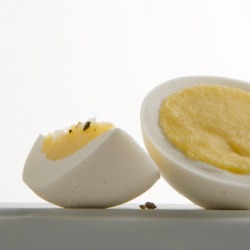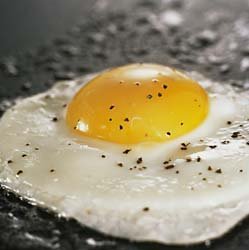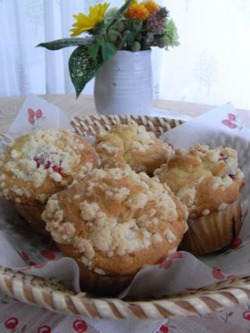.
You can use duck eggs just as you would chicken eggs. Due to the high protein content in duck eggs there are just a few tricks you should know to keep them tender so they don't get rubbery from overcooking.
Also, when beating egg whites in duck eggs it takes a bit more work to break the gel, part of that is because they're so fresh; making sure eggs are room temperature first will help (or add a bit of baking soda) . But once you get them frothy they whip up nicely and add lots of loft to baked goods.
Also, when beating egg whites in duck eggs it takes a bit more work to break the gel, part of that is because they're so fresh; making sure eggs are room temperature first will help (or add a bit of baking soda) . But once you get them frothy they whip up nicely and add lots of loft to baked goods.
Hard Boiled Duck Eggs

Hard-cooked duck eggs are just like hard-cooked chicken eggs, only a bit richer. Because of the extra protein in the white, it is especially important not to overcook them.
To hard-cook duck eggs, place them in a pot, cover them with cold water, and bring to a boil over high heat. As soon as the water boils, remove the pot from the heat and let stand 12 minutes for large eggs. (Medium eggs should sit a minute less, jumbos a minute more.) Drain the eggs and shake the pan vigorously to crack the shells; this lets them cool faster and prevents overcooking. Cover with cold water (I add a few ice cubes) and let cool. Once cool, you can peel them. If you don’t eat them immediately, store them in a bowl in the refrigerator, covered with water.
This method — which does not involve boiling the eggs at all, hence my borrowing Julia Child’s term "hard cooked" — gives tender whites, fully-cooked yolks with no greenish tinge, and no sulfury smell. Not to mention it is incredibly easy, so long as you don’t go off and forget them on the stove.
Incidentally, I had read that hard-cooked duck eggs have bluish whites and red yolks. Fascinating, I thought, and wondered if this was due to mineral content: more copper in the white, more iron in the yolk, perhaps? Then I hard-cooked a few, and the whites were white (whiter than chicken eggs, in fact) and the yolks were orange. Whoop-de-do. So much for my science experiment. But quite tasty.
Special thanks to The New Agrarian
To hard-cook duck eggs, place them in a pot, cover them with cold water, and bring to a boil over high heat. As soon as the water boils, remove the pot from the heat and let stand 12 minutes for large eggs. (Medium eggs should sit a minute less, jumbos a minute more.) Drain the eggs and shake the pan vigorously to crack the shells; this lets them cool faster and prevents overcooking. Cover with cold water (I add a few ice cubes) and let cool. Once cool, you can peel them. If you don’t eat them immediately, store them in a bowl in the refrigerator, covered with water.
This method — which does not involve boiling the eggs at all, hence my borrowing Julia Child’s term "hard cooked" — gives tender whites, fully-cooked yolks with no greenish tinge, and no sulfury smell. Not to mention it is incredibly easy, so long as you don’t go off and forget them on the stove.
Incidentally, I had read that hard-cooked duck eggs have bluish whites and red yolks. Fascinating, I thought, and wondered if this was due to mineral content: more copper in the white, more iron in the yolk, perhaps? Then I hard-cooked a few, and the whites were white (whiter than chicken eggs, in fact) and the yolks were orange. Whoop-de-do. So much for my science experiment. But quite tasty.
Special thanks to The New Agrarian
Fried Duck Eggs

You can fry duck eggs just like chicken eggs, provided they aren’t huge.
Up to jumbo size (2.5 ounces) will fry just fine. I prefer mine fried in bacon fat, but butter is fine. No margarine, please: my girls worked too hard laying these eggs to louse them up with chemicals!
Very fresh eggs will "stand up" in the pan: both the white and yolk will stay more compact and spread less when cracked. This makes them thicker, so they’ll take longer to cook through; you may need slightly less heat than with less-fresh eggs. I find that eggs even a week old will spread more in the pan, so you’ll have to adjust your technique according to the age of the eggs.
Many people recommend steam-frying duck eggs, frying them briefly then adding a bit of water to the pan and covering it until they are cooked through. This will give more tender whites. The whites of duck eggs have more protein than those of chicken eggs, so fried they are not quite as tender; but I find the difference to be slight for reasonably sized eggs. For super-jumbo eggs, you may find steam-frying necessary, but frankly if you have to resort to steam-frying I think you should just make an omelet.
Special thanks to The New Agrarian
Up to jumbo size (2.5 ounces) will fry just fine. I prefer mine fried in bacon fat, but butter is fine. No margarine, please: my girls worked too hard laying these eggs to louse them up with chemicals!
Very fresh eggs will "stand up" in the pan: both the white and yolk will stay more compact and spread less when cracked. This makes them thicker, so they’ll take longer to cook through; you may need slightly less heat than with less-fresh eggs. I find that eggs even a week old will spread more in the pan, so you’ll have to adjust your technique according to the age of the eggs.
Many people recommend steam-frying duck eggs, frying them briefly then adding a bit of water to the pan and covering it until they are cooked through. This will give more tender whites. The whites of duck eggs have more protein than those of chicken eggs, so fried they are not quite as tender; but I find the difference to be slight for reasonably sized eggs. For super-jumbo eggs, you may find steam-frying necessary, but frankly if you have to resort to steam-frying I think you should just make an omelet.
Special thanks to The New Agrarian
Baking with Duck Eggs

You can freely substitute duck eggs for chicken eggs in cakes, pies, cookies, custards, etc. They are excellent in all things baked.
Because the whites of duck eggs have more protein than those of chicken eggs, they will whip up higher when beaten and create more loft in cakes. This means lighter, higher cakes. But since the yolks are so rich, your cakes may also be richer with duck eggs. Most people who have baked with them prefer duck eggs for those reasons. Some pastry chefs argue against baking with duck eggs lest they unbalance finely calibrated recipes, but I have found few recipes to be as finely calibrated as their authors often believe. I would assume that in any given recipe you can substitute an equivalent weight of duck eggs, and if you don’t like the results, you can always make it with chicken eggs next time.
A few words on beating egg whites: it takes a bit more work to break the gel when beating whites of duck eggs. Once you get them frothy, however, they beat up fairly easily.
If your eggs vary in size, you’ll need to adjust your recipes accordingly. Recipes assume large eggs, and you can substitute a large duck egg (two ounces or so) for a large chicken egg. If you only need two or three eggs, just estimate: use one that’s a bit larger and one that’s a bit smaller. For larger recipes, weigh the eggs after cracking. Here are the standard weights for large chicken eggs:
Because the whites of duck eggs have more protein than those of chicken eggs, they will whip up higher when beaten and create more loft in cakes. This means lighter, higher cakes. But since the yolks are so rich, your cakes may also be richer with duck eggs. Most people who have baked with them prefer duck eggs for those reasons. Some pastry chefs argue against baking with duck eggs lest they unbalance finely calibrated recipes, but I have found few recipes to be as finely calibrated as their authors often believe. I would assume that in any given recipe you can substitute an equivalent weight of duck eggs, and if you don’t like the results, you can always make it with chicken eggs next time.
A few words on beating egg whites: it takes a bit more work to break the gel when beating whites of duck eggs. Once you get them frothy, however, they beat up fairly easily.
If your eggs vary in size, you’ll need to adjust your recipes accordingly. Recipes assume large eggs, and you can substitute a large duck egg (two ounces or so) for a large chicken egg. If you only need two or three eggs, just estimate: use one that’s a bit larger and one that’s a bit smaller. For larger recipes, weigh the eggs after cracking. Here are the standard weights for large chicken eggs:
Special thanks to The New Agrarian






